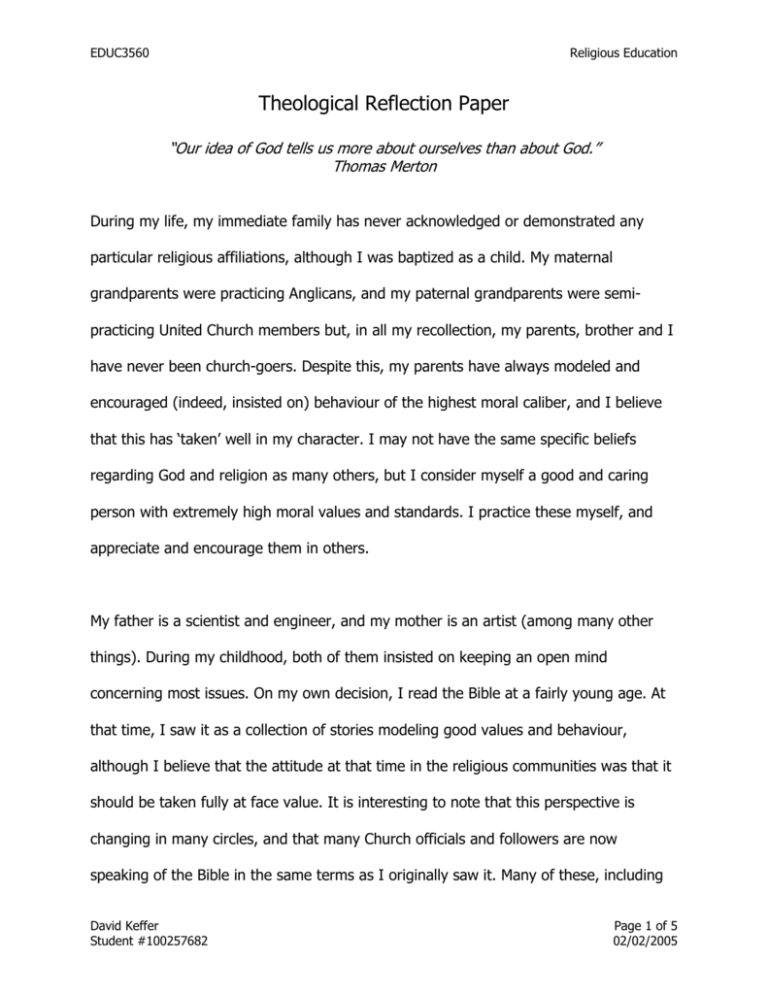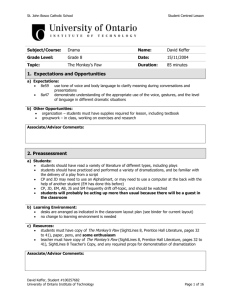Theological Reflection Paper
advertisement

EDUC3560 Religious Education Theological Reflection Paper “Our idea of God tells us more about ourselves than about God.” Thomas Merton During my life, my immediate family has never acknowledged or demonstrated any particular religious affiliations, although I was baptized as a child. My maternal grandparents were practicing Anglicans, and my paternal grandparents were semipracticing United Church members but, in all my recollection, my parents, brother and I have never been church-goers. Despite this, my parents have always modeled and encouraged (indeed, insisted on) behaviour of the highest moral caliber, and I believe that this has ‘taken’ well in my character. I may not have the same specific beliefs regarding God and religion as many others, but I consider myself a good and caring person with extremely high moral values and standards. I practice these myself, and appreciate and encourage them in others. My father is a scientist and engineer, and my mother is an artist (among many other things). During my childhood, both of them insisted on keeping an open mind concerning most issues. On my own decision, I read the Bible at a fairly young age. At that time, I saw it as a collection of stories modeling good values and behaviour, although I believe that the attitude at that time in the religious communities was that it should be taken fully at face value. It is interesting to note that this perspective is changing in many circles, and that many Church officials and followers are now speaking of the Bible in the same terms as I originally saw it. Many of these, including David Keffer Student #100257682 Page 1 of 5 02/02/2005 EDUC3560 Religious Education Catholic priests, are now referring to the Bible as a series of parables, with associated morals and values, rather than a history of true events. Indeed, it is very unlikely that the Bible is a true history, as it has been passed down over millennia by word-of-mouth, and has been subjected to many translations of various levels of accuracy. During my youth I read a lot (I still do!), and was greatly interested by science and mathematics. My preferred genre of fiction was, and still is, science fiction and fantasy. This extensive reading has shaped my thinking of the universe to a large degree as, by its very nature, it emphasizes new ways of looking at traditional situations, and presents many new ideas for contemplation and reflection. Considering the wider universe beyond our own planet, and considering the myriad opportunities for life elsewhere, it seems to me that the views of many religions are chauvinistic. It was in the area of science that I discovered, in the form of a poster given to me by my father, the idea which even now comes most closely to my own views of religion and God. It is a quote from Albert Einstein (appended to this paper), which begins, “The fairest thing we can experience is the mysterious.” I was captivated when I first read this, and have subsequently read many views on religion by Einstein and others, but this remains my favourite. It speaks to my own personal convictions that there are things in the universe which are inherently unknowable, or “the existence of something we cannot penetrate,” and which can elicit such feelings of awe and wonder in humankind. Much of practiced religion throughout history has taken these feelings and interpreted them within a framework of omnipotent beings, or gods, which have been credited with, or blamed David Keffer Student #100257682 Page 2 of 5 02/02/2005 EDUC3560 Religious Education for, all manner of natural occurrences. It is this interpretation of the unknown, and unknowable, of which I remain unconvinced. I have considered the ideas of religion and God many times through my life, and am certainly not atheistical. I cannot convince myself that everything ‘just happened,’ as many scientists maintain. Neither, however, can I convince myself of the existence of an anthropomorphized God, creating and controlling everything. Other common images of God are also difficult for me to accept, such as the ‘feared’ God, or God ‘the great manipulator.’ In fact, many of the common images of God conflict with each other. According to Knox; “Christians, Jews and Muslims not only believe in a personal God but, very importantly, they believe that this God is not an arbitrary or capricious God. On the contrary, they believe that he is a good and gracious God who has the wellbeing of the world, of the whole of creation, at heart.” 1 I have great difficulty reconciling this image of God with the tragic events, both historical and current, of the world. According to the Bible, no one has ever seen God. Instead, people must rely on their own, or others’, interpretation of events and experiences, as related in the form of stories or parables. I can understand that such interpretation is extremely subjective, and perhaps this explains the great proliferation of images of God which are accepted. It is true, as Einstein notes in his essay, that it is this ‘experience of the mysterious’ which has engendered much of the art, science, religion, and many other aspects of 1 Theology for Teachers; Knox, I.; © Novalis, 1999; ISBN #2-89507-020-2; pg 18. David Keffer Student #100257682 Page 3 of 5 02/02/2005 EDUC3560 Religious Education human history. He proposes that “If there is any such concept of a God, it is a subtle spirit … ,” and refers to religion as a “humble admiration for this illimitable superior spirit … which knows no dogma and no God conceived in man’s image …” It is the dogmatic aspect of religion which is one of the most difficult for me to accept – the superior assertion of each religion that it, and it alone, is in possession of the absolute and exclusive Truth. There is nothing wrong in saying, “We are not sure, you may be right.” I am pleased, and relieved, to note that one of the current missions of the Catholic Church is to live in harmony with other religions, as religious conflict has historically engendered much of the grief and suffering in the world. I sincerely hope that this view spreads quickly to other world religions which still insist on conflict. I have been married now for almost twenty-three years to a wonderful woman who is also my best friend, and we have a daughter who is now almost nine. My wife and I share most of the same moral values, and we do our best to raise our daughter to the same high standards. We also encourage her to keep an open mind, just as my own parents encouraged. Our daughter has a child’s innate curiosity about the workings of the universe, and has already asked many questions regarding religion, which we answer as honestly and openly as we can. Members of our extended family also provide her with different perspectives than ours. Regardless of her beliefs at any particular point in her life, I sincerely hope she never loses her appreciation and wonder of the ‘mysterious.’ I hope I never lose it either! David Keffer Student #100257682 Page 4 of 5 02/02/2005 EDUC3560 Religious Education The fairest thing we can experience is the mysterious. It is the fundamental emotion which stands at the cradle of true art and true science. He who knows it not and can no longer wonder, no longer feel amazement, is as good as dead, a snuffed-out candle. It was the experience of mystery – even if mixed with fear – that engendered religion. A knowledge of the existence of something we cannot penetrate, of the manifestations of the profoundest reason and the most radiant beauty, which are only accessible to our reason in their most elementary forms – it is this knowledge and this emotion that constitute the truly religious attitude; in this sense, and in this alone, I am a deeply religious man. If there is any such concept as a God, it is a subtle spirit, not an image of a man that so many have fixed in their minds. In essence, my religion consists of a humble admiration for this illimitable superior spirit that reveals itself in the slight details that we are able to perceive with our frail and feeble minds. It is very difficult to elucidate this feeling to anyone who is entirely without it, especially as there is no anthropomorphic conception of God corresponding to it. The individual feels the futility of human desires and aims and the sublimity and marvelous order which reveal themselves both in nature and in the world of thought. Individual existence impresses him as a sort of prison and he wants to experience the universe as a single significant whole. The religious geniuses of all ages have been distinguished by this kind of religious feeling, which knows no dogma and no God conceived in man's image; so that there can be no church whose central teachings are based on it. Albert Einstein from “The World as I See It” David Keffer Student #100257682 Page 5 of 5 02/02/2005










